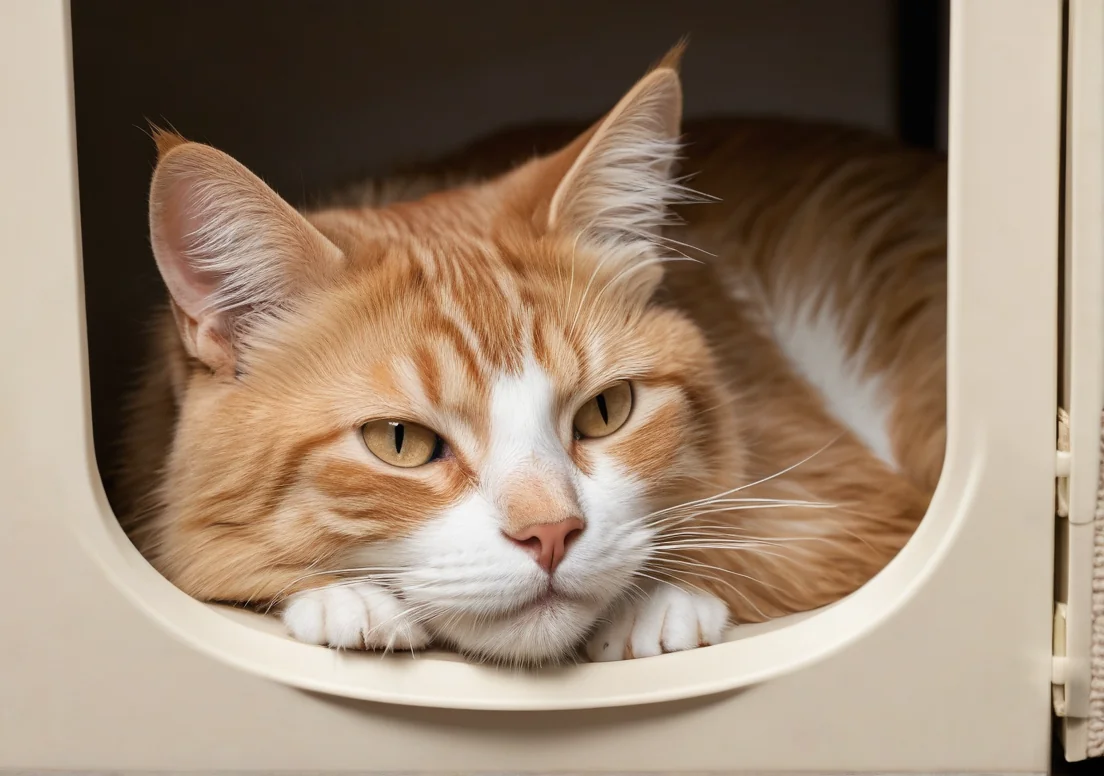Cat lovers often find themselves puzzled by their feline friends’ quirky behaviors. One of the more concerning habits is when a cat makes the litter box its go-to napping spot. Isn’t that a little baffling?
Cats may seek the litter box for various reasons, including comfort from the texture, safety in a confined space, or even as a sign of stress or illness. But there’s much more to unravel about this behavior than just a simple explanation. Let’s explore the fascinating world of cat behavior to uncover the details behind this litter box preference.

Why Does My Cat Prefer the Litter Box for Sleeping?
Cats are notoriously quirky creatures, often choosing the most unexpected spots to catch some Zs. If you’ve noticed your feline friend napping in the litter box, it could be more than just a strange habit. A few reasons might explain this peculiar behavior.
Safety & Security : The litter box can provide a sense of security. For a cat, it’s a space they consider “theirs,” surrounded by familiar scents. If your cat feels anxious or stressed, they might retreat to the litter box as a safe haven.
A Unique Scent Marker : Cats are highly olfactory animals. The litter box has smells that are comforting and familiar. They might find that smell soothing, especially in a stressful environment or when dealing with changes at home, like new pets or guests.
Territorial Behavior : Cats are instinctively territorial. Sleeping in the litter box might be a way for your cat to assert their claim over that space, blending safety and comfort into one.
If this behavior seems excessive or worrisome, it’s wise to consult your vet. Excessive sleeping in a litter box can also indicate underlying health issues, like stress or urinary tract problems.
Is It a Comfort Issue?
Texture and warmth can make a significant difference in a cat’s choice of sleeping spots. The litter’s texture might offer a unique comfort that your cat craves.
Softness & Warmth : Many cats enjoy soft surfaces. Depending on the type of litter you use, the granules might feel cozy against their fur. Also, litter can retain heat better than some other surfaces, making it an inviting spot for a nap, especially in cooler weather.
Nest-Like Behavior : By instinct, cats often seek out places that feel den-like. When litter is loosely placed, it can mimic the sensation of nestling into soft bedding. This allows them to burrow slightly, providing a false sense of security akin to how they might feel in the wild.
Signs of Comfort:
- Purring: If your cat is purring while in the litter box, it often indicates they feel content.
- Rolling Around: They might roll around in the litter box, showing they’re comfortable and marking their territory.
- Frequent Visits: The more often your cat opts for the litter box for a snooze, the clearer it is that they find it comfortable in some way.
If you suspect your cat finds comfort in the litter box, consider addressing potential comfort issues with their bedding options. Providing softer, warmer bedding nearby could help redirect their napping habits to a more suitable spot while still ensuring they’re cozy and secure.
Could It Indicate Stress or Anxiety?
Cats are creatures of habit, but when they start choosing the litter box as a nap spot, it could be a sign that something’s amiss. Stress and anxiety in cats can stem from various sources, like changes in their environment, new pets, or even shifts in your routine. When a cat feels vulnerable, they might seek out enclosed spaces—like the litter box—for a sense of safety.
Look for additional signs of stress, such as hiding, aggression, or changes in eating habits. Sometimes, a stressful situation can make them feel like their usual resting spots are no longer safe, so they resort to less conventional choices.
If you’ve recently moved or had visitors, consider how these disruptions could affect your feline friend. Creating a calmer environment might help. You can try using calming diffusers or enabling more playtime to soothe their nerves. Additionally, ensure they have cozy, quiet areas to retreat to; providing a safe haven can help alleviate their anxiety.
Are There Medical Concerns at Play?
If your cat prefers the litter box over their bed, it might not just be about comfort—health issues could be involved. Cats often gravitate to places that feel safe and secure, especially if they’re experiencing pain or discomfort. For instance, urinary tract infections, kidney problems, or even arthritis can lead them to associate their litter box with relief.
Pay attention to changes in their bathroom habits, such as increased frequency or straining. This may indicate a medical problem that needs addressing.
Consider common health issues related to litter box behavior:
Urinary Tract Infections : Frequent trips to the box and painful urination can push them to seek comfort in the litter.
Kidney Disease : Increased thirst and urination can lead to them spending more time in their box.
Arthritis : If jumping to their bed is challenging, they might find it easier to access the litter box.
If you notice signs of distress or other health concerns, it’s crucial to consult your vet. They can evaluate your cat and provide the necessary treatment to get them back to their usual cozy spots.
What About Instinctual Behaviors?
Cats have some pretty strong instincts shaped by their wild ancestors, and sometimes their behaviors can leave us scratching our heads. Sleeping in the litter box might seem odd, but it can stem from instinctual traits. Litter boxes provide a covered, often enclosed space, similar to the burrows some wild felines might use. This offers a sense of safety and protection.
Additionally, the scent molecules in the litter may give them comfort and familiarity. Cats have an incredible sense of smell, and the scents can be calming. If your cat feels anxious or stressed, they may gravitate towards the litter box as a safe haven. It’s also worth considering that certain health issues could lead to this behavior, making them associate the litter box with a safe place if they’re feeling unwell. Keep a close eye on any changes in their routine or behaviors, as they might be trying to tell you something important.
How Does Territory Play a Role?
Territory is everything for cats. They’re instinctively motivated to claim and defend their space, which informs where they choose to snooze. The litter box might be an unexpected favorite spot because it carries their scent. A cat sleeping there can feel like they’re affirming ownership over that area, which can bring them peace.
Moreover, if multiple pets share the same household, your cat may feel compelled to stake their claim on the litter box as a high-value location, especially if it’s a spot they associate with security. If the litter box is the only spot they see as their territory, they might opt to sleep there rather than risk being exposed or vulnerable elsewhere. If you notice your cat doing this frequently, consider offering more cozy sleeping spots throughout your home to help them feel safe and comfortable. This could help divert them away from the litter box for napping.
Could It Be a Litter Preference?
Cats can be quite particular about their environment, and litter choice is no exception. If your feline friend opts to nap in the litter box, it might be a sign that they’re drawn to the particular texture or scent of the litter you’re using. For instance, some cats prefer clumping litter because it mimics the feel of softer surfaces, while others are fans of crystal litter for its low dust and odor control.
Additionally, if the litter box is a cozy retreat—think about the box’s location, size, and cleanliness—your cat might see it as a prime spot for relaxation. If the box is located in a quiet area free of interruptions, that can appeal to their instinctive need for security. So, consider making small changes, like trying out different brands or types of litter, or ensuring the box is always clean to see if that sparks a shift in behavior.
What Do Experts Say About This Behavior?
Veterinarians and animal behaviorists often view a cat sleeping in the litter box as a multifaceted issue. Some suggest it can stem from stress, especially if the cat feels anxious or insecure in its environment. In such cases, increased stressors—like new pets, loud noises, or even changes in your routine—might push them to seek solace in their safe space.
Additionally, if a cat is older or unwell, they may gravitate toward familiar spots, and the litter box might become a comfortable haven. It’s crucial to keep an eye on any other signs of discomfort or health issues, as this behavior could be a subtle alarm signal.
Veterinary insights frequently mention the importance of monitoring litter box usage. If your cat starts spending excessive time in there, consider scheduling a check-up. Overall, creating a calming environment with plenty of enrichment can help alleviate the urge to seek comfort in the litter box.
An Interesting Fact About Cat Sleeping Habits
Cats are known for their peculiar sleeping habits. Did you know they typically spend around 16 to 20 hours a day snoozing? This high amount of sleep comes from their ancestry as predators; cats need to conserve energy for hunting, so they often take long naps throughout the day. Their sleep patterns can be divided into light sleep and deep sleep, and they can wake up at a moment’s notice.
Interestingly, cats often prefer warm, cozy spots—so it’s not shocking when they curl up in a litter box. The mix of warmth and the surrounding scent can feel safe and comforting to them. However, while your kitty might see the litter box as a comfy retreat, it might also signal other concerns, such as anxiety or a health issue. Always monitoring their behavior can help distinguish if it’s a quirky quirk or something more concerning.
Alex, a passionate animal lover, has experience in training and understanding animal behavior. As a proud pet parent to two dogs and three cats, he founded AnimalReport.net to share insights from animal experts and expand his knowledge of the animal kingdom.




